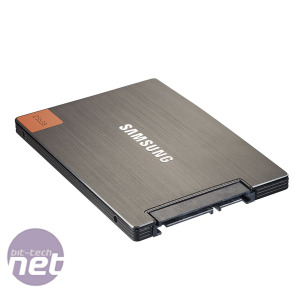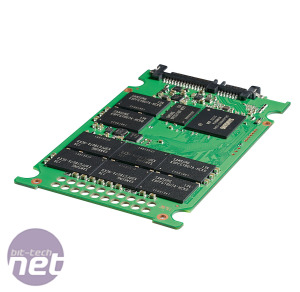
Performance Analysis
The Samsung 830's lack of compression technology means that it has little to fear from AS-SSD's incompressible data test, and its sequential performance quickly impressed us. A sequential read speed of 512MB/sec is 5MB/sec quicker than the Crucial M4 256GB, and only a little slower than the OCZ Vertex 3 240GB. The Samsung 830's sequential write speed is also particularly impressive; it consistently produced close to 400MB/sec, more than 100MB/sec faster than any other single drive SSD we've tested.As usual, single-queue depth 4KB random read and write speeds are lower, but a read speed of 24MB/sec matches that of the Vertex 3, and a write speed of 105MB/sec is only a little slower than the Crucial M4 256GB in the same test.
Switching to the ultra-demanding 64-queue depth 4KB random read and write test produced an odd result, though. While a read speed of 281MB/sec is the best we've seen from any drive, the write speed was just 80MB/sec, a slower result than when handling just a single thread of 4KB writes. We asked Samsung about this, and were told that, as the Samsung 830 is designed as a consumer SSD, it isn't optimised for such a high and arguably server-level workload. This is a fair decision, and in additional testing with 16 and 32-queue depth 4K writes, the drive delivered speeds of 138MB/sec in similar tests.
In the ATTO disk benchmark, 4KB sequential reads peaked at 198MB/sec, notably slower than those of the Crucial M4 256GB and Vertex 3 240GB, while 4KB sequential write speeds were also a little slow in comparison to the competition at 188MB/sec. However, in most real-world usage, the difference is imperceptible. When handling larger 1,024KB sequential read and writes, the Samsung 830 really hit its stride, and actually managed to surpass its rated speeds. A read speed of 537MB/sec is 11MB/sec faster than the Crucial M4 256GB in the same test, while the Samsung 830's huge write speed of 397MB/sec was more than 100MB/sec faster than the Crucial in the same test. The Vertex 3 240GB is technically faster in this respect, but this is due to its use of compression technology and ATTO's compressible test data.
We also found that even after completely filling the drive with incompressible data, clearing it and then enabling TRIM, the drive's performance remained unchanged, which bodes well for the Samsung 830's ability to maintain performance during heavy usage.


The Samsung SSD 830 may be late to the market, but it competes with the big boys, and its sequential write speed is excellent
Conclusion
With the SSD 830 256GB, Samsung has come in from the OEM cold to once again warm consumers' PCs, and it's been worth the wait. The Samsung 830 is an extremely quick and well-rounded SSD, capable of unmatchable single-drive write speeds. It also boasts read speeds that match those of the competition.However, with Crucial, Intel and SandForce's multitudinous partners having stolen a march on Samsung, it remains to be seen whether the South Korean giant can carve out as big a piece of the consumer SSD market as it has with the OEM market. The Samsung 830's price isn't going to help it in this - despite the use of in-house components and 20nm NAND, the 256GB version will hit retailers at £350. That's £1.47 per gigabyte compared to the Crucial M4 256GB's £1.14 per gigabyte, and the latter offers similar performance.
While it isn't as keenly priced as we'd have liked, though, the Samsung 830 has still earned its spurs as the fastest SSD out there. Those willing to the pay the extra cash will be rewarded with excellent read and phenomenal write performance. Good to have you back, Samsung.

-
Value20 / 35
-
Features14 / 15
-
Speed47 / 50


MSI MPG Velox 100R Chassis Review
October 14 2021 | 15:04








Want to comment? Please log in.